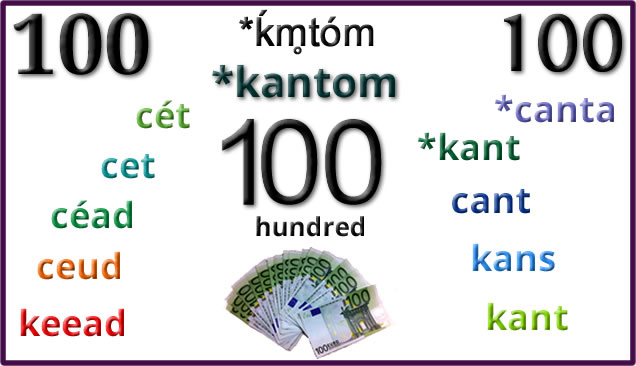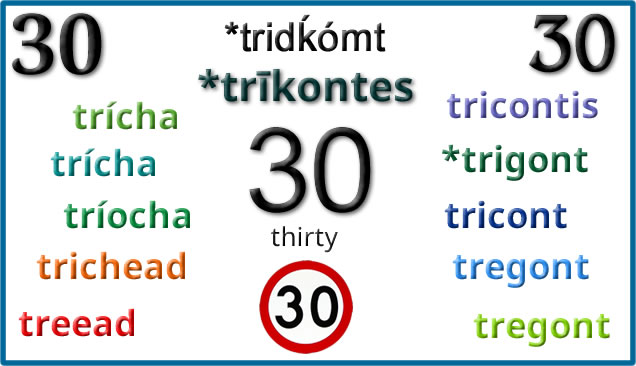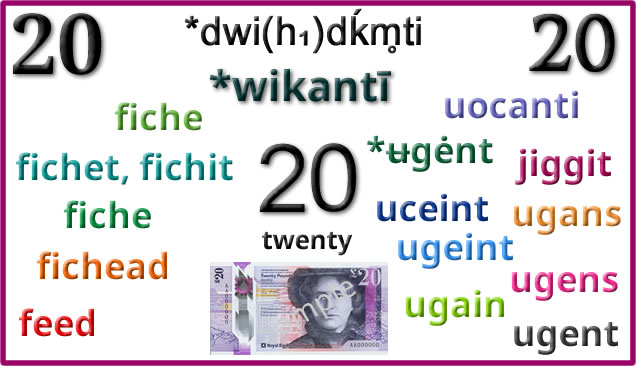Words for beak, snout and related things in Celtic languages.
| Proto-Celtic | *gobbos = muzzle, snout, beak |
|---|---|
| Gaulish | *gobbos [ˈɡob.bos] = mouth |
| Old Irish (Goídelc) | gop = beak, snout, muzzle |
| Middle Irish (Gaoidhealg) | gop, guib, guip = muzzle, snout, beak, point/head of a spear, thin-mouthed, sharp-pointed |
| Irish (Gaeilge) | gob [ɡɔbˠ/ɡɞbˠ/ɡʌbˠ] = beak, bill, tip, point, projection gobach = beaked, long-billed, sharp (expression), pointed, lipped (jug) gobachán = sharp-featured person, beak-nosed person, sharp-tongued person, inquisitive/interfering person, chatterer, gossip gobadh = protrusion, shooting, springing, sprouting gobaí = bird with a long beak, person with pointed features gobaireacht = picking, pecking, chattering, chatter, gossip gobán = (small) tip, point, gag, dummy goblach = beakful, mouthful, morsel, lump, chunk |
| Scottish Gaelic (Gàidhlig) | gob [gob] = beak, bill, gob, pointed/sharp end, corner, spit (of land), point (of a fishing hook) gobachadh = pecking, rising (wind), poking through gobad [gobag] = talkative female, little bill, cabin hook goban = small mouth, small beak gobaire = chatterbox, chattterer, tell-tale gobach [gobəx] = beaked, snouty, cheeky, chatty |
| Manx (Gaelg) | gob = apex, headland, hook, jet, jut, nose(piece), point, prominence, promontory, beak, nib, spout, mouth, muzzle, bow (of ship) gobbagh = beaked, billed, nibbed, prominent, salient gob-rollian = talkative person |
Etymology: from the Proto-Indo-European *ǵebʰ- (jaw, mouth). Words from the same Proto-Celtic root include gober (to swallow hole) and gobelet (goblet, cup, beaker) in French, and gob (a slang word for mouth) and goblet in English, [source].
| Proto-Celtic | *bekkos = beak, snout |
|---|---|
| Gaulish | *bekkos = beak, snout |
| Proto-Brythonic | *bek = beak, snout |
| Middle Breton (Brezonec) | becq, beeg, bêg, beg = mouth, beak, snout, point, cape, summit |
| Breton (Brezhoneg) | beg = beak, mouth, point, mouthpiece, embouchure beg-douar = point beg-hir = dolphin |
Etymology: possibly from the Proto-Indo-European *bak- (peg, club) [source].
Words from the same roots, via the Gaulish *bekkos and the Latin beccus (beak, bill), include bec (beak, bill, mouth) in French, beco (beak, mouthpiece, burner) in Italian, bico (beak, bill, snout, rostrum) in Portuguese, pico (beak, sharp point, pickaxe, peak, spout) in Portuguese, bek (beak, snout, mouth) in Dutch, and beak in English [source].
| Proto-Celtic | *gulbā, *gulbīnos = beak, bill |
|---|---|
| Gaulish | *gulbiā = beak, bill |
| Old Irish (Goídelc) | gulban, gulpan = bird’s beak |
| Middle Irish (Gaoidhealg) | gulba = beak, mouth, jaw gulban = beak, sting gulbanda = beaked, piercing gulbnech = beaked, sharp-beaked gulbnén = small beak gulbnide = biting gulbniugad nibbing, biting |
| Irish (Gaeilge) | gulba = beak, bill, tip, point, projection guilbneach = (sharp-)beaked, curlew guilbnéan = little beak guilbnigh = to peck |
| Scottish Gaelic (Gàidhlig) | gulb [gul̪ˠub] = beak, nose gulban [gul̪ˠuban] = beak, nose guilbneach [gulubnəx] = curlew |
| Proto-Brythonic | *gulbino- = beak, snout |
| Middle Welsh (Kymraec) | gilbin, gyluin, gylfin = bird’s beak, snout gylfinir, gelvinir, gylfinhir = curlew |
| Welsh (Cymraeg) | gylfin = bird’s beak, bill, snout, sharp-pointed nose, mouth, lip gylfinaid = beakful, mouthful gylfinir = curlew gylfinog = beaked, rostrated, wild daffodil, narcissus |
| Old Cornish | geluin = beak, bill |
| Middle Cornish (Cernewec) | gelvin = beak, bill gelvinac, gylvinac = curlew |
| Cornish (Kernewek) | gelvin = beak, bill gelvinek = curlew |
| Old Breton | golbin = cape, promontory, headland, rostrum |
| Middle Breton (Brezonec) | golff, golf = tailless |
| Breton (Brezhoneg) | golv = tailless, naturally |
Etymology: probably of non-Proto-Indo-European origin. Words from the same root, via Gaulish *gulbiā and the Latin gulbia (piercer, chisel), gulbia (gouge) in Galician, gubia (gouge) in Spanish, gorbia (ferrule) in Italian, and gouge in English and French [source].
Words marked with a * are reconstructions.
Sources: Wiktionary, Am Faclair Beag, Online Manx Dictionary, Teanglann.ie, eDIL – Electronic Dictionary of the Irish Language, In Dúil Bélrai English – Old Irish glossary, Geiriadur Prifysgol Cymru, Gerlyver Kernewek, Dictionaire Favereau, TermOfis, English – ProtoCeltic WordList (PDF), Etymological Dictionary Of Proto Celtic










